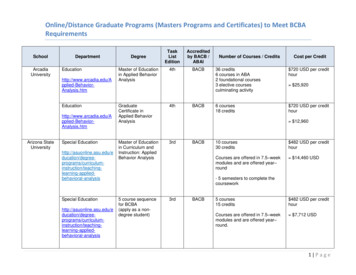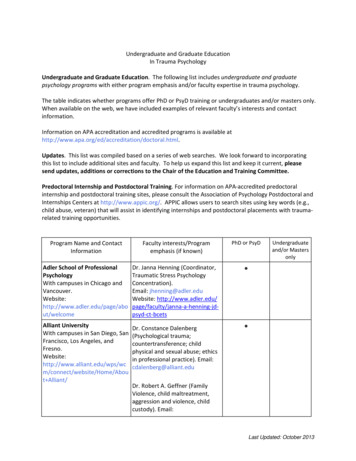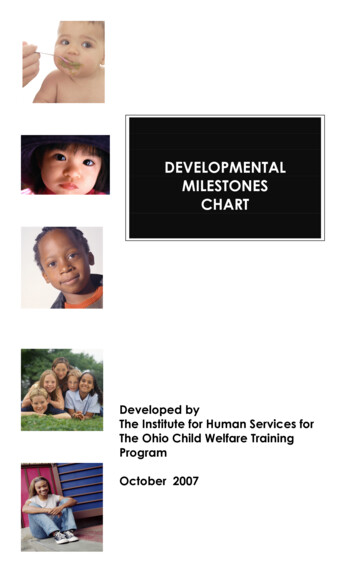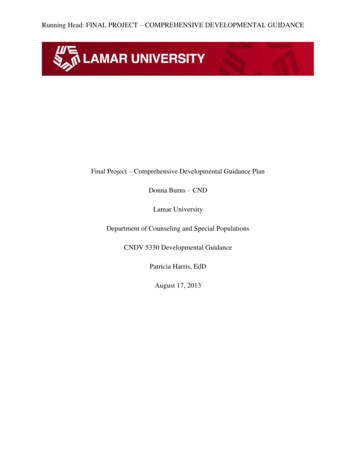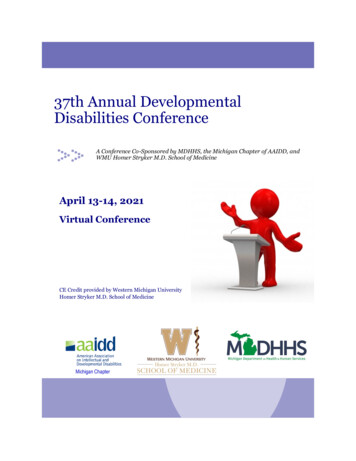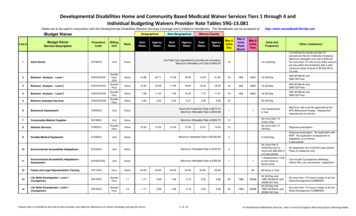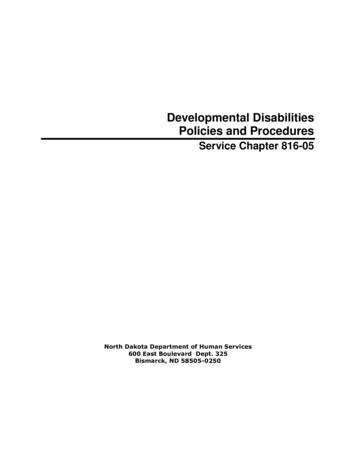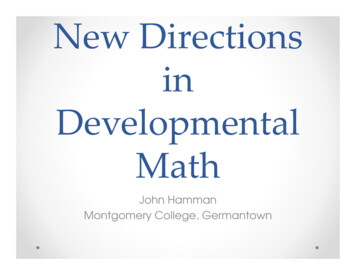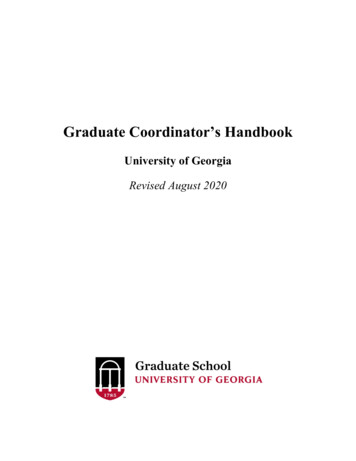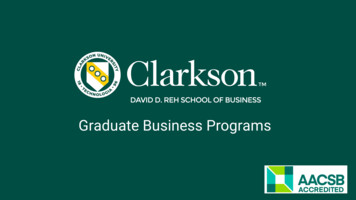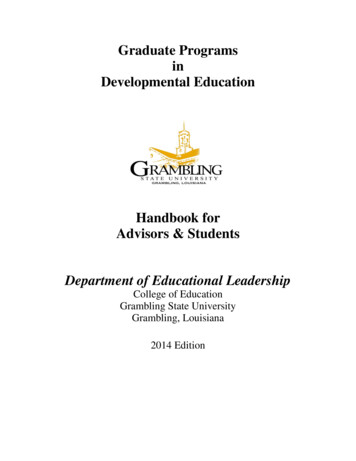
Transcription
Graduate ProgramsinDevelopmental EducationHandbook forAdvisors & StudentsDepartment of Educational LeadershipCollege of EducationGrambling State UniversityGrambling, Louisiana2014 Edition
2TABLE OF CONTENTSPROGRAM PHILOSOPHYDefinition of Developmental Education46GENERAL INFORMATIONAdmissionNon-Degree StatusRe-AdmissionChange of ConcentrationGraduate Credit LoadProbationSuspensionProgram Applications and FormsApproved Style Manual677788889MASTER OF SCIENCE DEGREEAdmission to Graduate SchoolAdmission to M.S. ProgramProcessRequirements for Regular AdmissionPermanent AdvisorThe AdvisorChange of AdvisorProgram of StudyMajor CoursesResearch Methods and StatisticsConcentrationEnglish ProficiencyElectivesPracticumPracticum RequirementsCritical PaperComprehensive ExaminationCandidacyGraduationQualifications to 13131313
3DOCTOR OF EDUCATION DEGREEAdmission to Graduate SchoolAdmission to Ed.D. ProgramProcessTemporary AdvisementRequirements for Regular AdmissionRequirements for Conditional AdmissionMajor ProfessorDoctoral CommitteeQualifications for Doctoral Committee MembershipComposition of Doctoral CommitteeCommittee ResponsibilitiesProgram of StudyMajor (Foundations CORE)ConcentrationsEvaluation and ResearchEnglish ProficiencyElectivesInternshipDissertationTransfer CreditQualifying ExaminationResidencyPurposesOptions for Completing ResidencyAppropriate Residency ActivitiesCandidacyAdvancement to CandidacyTime Limit for Completing DegreeInternshipComprehensive ExaminationDissertationOverviewDissertation ProposalOral Defense of DissertationGraduationQualifications to ApplyRe-Application for GraduationTimeline for Dissertation ApprovalAcademic 12121212222222223242424252626262727
4THE PHILOSOPHICAL FOUNDATION OF GRADUATE PROGRAMS INDEVELOPMENTAL EDUCATIONRecent societal changes have resulted in overwhelming numbers of young andolder adults pursuing postsecondary degrees. While many of these persons evidenceadequate intellectual capacity, they lack academic and psychological preparedness for thechallenge and are often unable to perform up to their capacity or to meet minimumacademic standards. Inadequate backgrounds in the basic skills, social-emotionalmaladjustments to the learning environment, confused self-concepts and lack of propercareer guidance are accepted generally as significant deficits which plague, retard, andoften prevent academic and personal growth and development. Ultimately, these adultsare denied the level of success they might otherwise achieve.Underprepared adults require unique services from personnel who have receivedpreparation designed specifically to complement their needs. In response, the College ofEducation at Grambling State University, by offering advanced degree programs indevelopmental education, embraces as part of its mission and responsibility thepreparation of qualified personnel to serve underprepared adults–developmental learners–whether in traditional or nontraditional educational settings.Who are the developmental learners Grambling’s graduates will be prepared toserve? They are those students who for various reasons: (a) perform poorly or unevenlyon standardized achievement tests; (b) need preparatory or review work in basic skillssubjects before pursuing regular degree programs; (c) undertake enriching experiences toimprove average and below average academic performance; (d) require non-instructionalsupport that leads to self-awareness, academic responsibility and “careerwiseness;”(e) need remediation in areas where academic growth fails to occur at an acceptable rate;and/or (f) require additional training to meet changing job demands.Our belief is that developmental learners need assistance in achieving growth inone of a combination of academic, social-emotional areas. They might have such needsas entrants, or their needs may emerge throughout their academic careers. Thusdevelopmental education personnel must be prepared to render services at all levels of theacademic ladder. They must be prepared to examine the developmental learner from aholistic perspective and utilize this perspective to (a) create supportive learning climates;(b) provide appropriate curriculum and instruction; and (c) help students adjust to thechanges in life-style demanded by postsecondary studies and environments.
5Graduates of Grambling’s advanced degree programs in developmental educationwill be prepared specifically to assist adults of all ages to improve their study skills andacademic performance in areas such as reading, English and mathematics through thedelivery of instruction in regular classroom settings, tutorial programs, counselingactivities, and related support services. Because developmental education is a relativelyyoung field evidencing continual growth and scientific maturation, various personnel arein demand across the nation and in all sectors of society. Hence Grambling will preparenot only practitioners for the areas cited above, but also managers, program developers,administrators and researchers to facilitate the work of developmental practitioners.Further, the philosophy of Grambling State University recognizes developmentaleducation as the umbrella for services ranging from remediation to enrichment. Itrecognizes that even though a student might be intellectually capable, the absence ofsuccessful linking experiences and/or the preference for a certain academic area play amajor role in how well the student performs academically in a given area. Assessmentsof student performance may yield prescriptions which call for remediating or enrichingresponses from developmental education personnel. In large measure, and based upon thedefinition of developmental learners, remediation and enrichment differ only in thedegree to which there is an absence of experience or intellectual preference in an area onthe part of the learner. This philosophical viewpoint permeates the educational programsat all graduate degree levels in developmental education at Grambling State Universityand serves to guide faculty in the development of curriculum and instruction.Finally, the advanced degree programs in developmental education at GramblingState University are designed as comprehensive strategies which focus not only upon thewelfare of developmental learners, but also upon building a sense of scholarship,commitment and community among students. Degree candidates are challenged to utilizeprevious experiences and new information in a manner which allows them to makemaximum contribution to the University’s program and subsequent personal careerendeavors. Working together with peers on joint study and research projects;participating in professional organizations and meetings; building upon existingknowledge bases; sharing new knowledge through professional forums; providingconstant program feedback; utilizing available training resources and searching out otherswhere few or none are readily at hand; mastering the arts of inference, synthesis andapplication; assuming early personal responsibility for advanced academic learning; andensuring that high program standards be maintained are all basic contributions that eachcandidate is expected to make
6Definition of Developmental EducationDevelopmental Education is a field of practice and research within highereducation with a theoretical foundation in developmental psychology and learning theory.It promotes the cognitive and affective growth of all post-secondary learners, at all levelsof the learning continuum.Developmental education is sensitive and responsive to the individual differencesand special needs among learners.Developmental education programs and services commonly address academicpreparedness, diagnostic assessment and placement, affective barriers to learning, anddevelopment of general and discipline-specific learning strategies. (National Associationfor Developmental Education)GENERAL INFORMATIONAdmission1. A baccalaureate degree from an accredited college or university is aprerequisite for admission to graduate programs at Grambling StateUniversity.2. A student must apply to the Department of Educational Leadershipseparately for admission to a program in developmental education.Admission to the Graduate School does not mean automatic admissionto a degree program. Admission to a particular program is dependentupon acceptance by the department.3. All students seeking full admission to a program must submit acceptablescores on the Graduate Record Examination (GRE) and demonstrateEnglish proficiency.A. Graduate Record ExaminationA student must take and submit acceptable GRE scores to theGraduate School prior to admission to the program. Generalinformation about the GRE may be obtained from the UniversityTesting Center. Students may call the director of University Testing
7for information. Program specific requirements may be obtainedfrom the department.B. English ProficiencyDemonstrated English proficiency is required of all studentsentering graduate programs at Grambling State University. Studentsmay choose to demonstrate this proficiency by posting a minimumgrade of “B” in DEED 634 or posting a minimum of 3.5 on theanalytic portion of the GRE.Non-Degree StatusAn applicant who meets all requirements for admission as a graduate student butdoes not wish to earn a degree at Grambling State University may be admitted as a nondegree student. The student may not earn more than 12 semester hours of graduate creditto be applied later to a graduate degree. Such credit must be approved by the Departmentof Educational Leadership and the Graduate School and must be appropriate to theprogram. Credits earned with less than a grade of “B” will not be applied.Re-AdmissionA student who completes one degree and wishes to continue studies for a seconddegree at the same or a higher level must be re-admitted to the Graduate School and mustapply for admission to the new degree program. The procedure is as follows:A. Complete a Re-Admission Form. This form may be obtained from theGraduate School.B. Complete the application process for each new program as directed by theDepartment of Educational Leadership. Application credentials for oneprogram may not be transferred to another program. This policy includesletters of reference. New letters of reference must be submitted with eachnew application.Change of ConcentrationAn admitted student who wishes to change to another concentration within adevelopmental education degree program must notify the current advisor and thedepartment head. To initiate this procedure, a student must submit to the department
8head a letter requesting the change. Following a review of the request a decision will bemade about the need for changes in the advisory assignment and the program of study.These decisions will be communicated in writing to the dean of the College of Educationand the student.Graduate Credit LoadGenerally, 9-12 credit hours are considered to be a full load for full-time graduatestudents during the regular fall and spring semesters. During a regular summer session, 6hours is considered to be a full load.A graduate assistant, however, will not be permitted to schedule more than ninesemester hours in a regular semester. With the approval of the major advisor, departmenthead, and dean of the Graduate School, a graduate assistant with a superior academicrecord may schedule a maximum of 12 semester hours.ProbationAny graduate student with regular status whose cumulative grade point averagefalls below 3.0 will be placed on probation. A student who is re-admitted on probationmay be removed from such status when and if the cumulative grade-point average isincreased to 3.0 or better. Failure to maintain a current semester average of 3.0 or betterwhile on probation will result in suspension.SuspensionA student may not accumulate more than 9 semester hours of “C.” No gradebelow “C” is acceptable. A student with a grade of “D” or “F” is automatically droppedfrom the program and must petition the Graduate Council for re-admission.Petitions are accepted after the expiration of one semester or summer session. Asuspended student cannot be re-admitted more than once in pursuit of a graduate degree.Program Applications and FormsAll program applications and forms may be obtained from the office of thedepartment or from the department’s website. Applications and forms not directly related
9to the program but needed by all students may be obtained from the Graduate School orthe Graduate School website.Approved Style ManualAll written work in the graduate programs should be formatted according to stylespecification as given in the Publication Manual of the American PsychologicalAssociation, 6th (or later) edition. This publication is available in the universitybookstore. Other information on matters of approved style can be found in the School ofGraduate Studies available from the Department of Educational Leadership, and from theGuidelines for Preparing Research Proposals, Master’s Projects and Thesis, andDoctoral Dissertation.MASTER OF SCIENCE DEGREEStep 1: Admission to Graduate SchoolApplications for admission to the Graduate School can be obtained from theGraduate School or the Graduate School website. This form must be completed andreturned with the required application fee. Supporting documents that are requiredinclude GRE score reports, official transcripts of all undergraduate and graduate workcompleted and three letters/forms of reference. An individual must be admitted to theGraduate School before enrolling in courses at the university.Step 2: Admission to M.S. ProgramProcessFollowing admission to the Graduate School, the individual must submit to theDepartment of Educational Leadership an application for admission to the M.S. program.The application form is available in the departmental office and online at thedepartment’s website.
10The completed application form should be returned along with any necessarysupporting documentation. Applicants should have three letters of recommendations sentto the head of the department. Other needed documentation is secured by the departmentfrom the Graduate School.When an individual’s application materials are complete, they are evaluated by thedepartment’s graduate admissions committee. The student is notified by the DepartmentHead of the committee’s decision regarding admission to the M.S. program.Requirements for Regular Admission1. A baccalaureate degree from an accredited college or university.2.A minimum 2.5 GPA on the last degree earned.3.Acceptable GRE scores. (to be determined by graduate admissions committee.)Step 3: Permanent AdvisorThe AdvisorA permanent advisor will be assigned by the department head when a student isadmitted to the program. The student is responsible for making initial contact with theadvisor.Change of AdvisorThe permanent advisor continues to serve throughout the student’s matriculationin the master’s program unless it is determined that the relationship is not in a student’sbest interest. A request for change in advisory assignment should be submitted to thedepartment head.Step 4: Program of StudyMajor CoursesThe program of study must include the following major core courses: DEED 543,DEED 544, DEED 545, EDL 555 and DEED 548.
11Research Methods and StatisticsThe program of study must also include the following research methods andstatistics courses: EDL 549 and EDL 573.ConcentrationWith the assistance of the advisor, the student must select a concentration fromamong the following areas: reading, mathematics, English, science or postsecondaryguidance and counseling. A minimum of 9 semester hours of course work must becompleted in the concentration area. Concentrations in English, and science shouldinclude and in mathematics must include graduate course work taken outside the Collegeof Education.English ProficiencyDemonstrated English proficiency is required of all students enteringgraduate programs at Grambling State University.Students may choose todemonstrate this proficiency by posting a minimum grade of “B” in DEED 634 orposting a minimum of 3.5on the analytic portion of the GRE.ElectivesStudents will choose one or more electives (3 hours minimum) inconsultation with the major advisor.Step 5: PracticumPracticum RequirementsEach student is required to complete a semester-long supervised practicum(DEED 548) and related seminar. Prerequisites for this experience include completion ofat least twelve semester hours in the major and all the courses in the concentration andapproval by the advisor. Applications may be obtained from the department office orwebsite. The completed form should also be returned to the department head.The practicum seminar operates on a variable schedule basis. Students will benotified of specific meeting dates by the instructor. Students should expect to attend atleast one seminar on campus prior to starting work in the field.
12Critical PaperEach practicum student must summarize and evaluate practicum experiences in aportfolio. The portfolio should set forth newly acquired competencies and explain howthese competencies will be used in working with developmental students. A copy of thispaper must be submitted to the instructor and the advisor. Instructions for developing thepaper may be obtained from the instructor.Step 6: Comprehensive ExaminationA comprehensive written examination must be taken by all students pursuing theM.S. degree. This examination is designed to test a student’s competence and knowledgein the core courses and area of concentration. The comprehensive examination should betaken after a student has met the following criteria:A. Completed course work in the foundations coreB. Completed a minimum of 15 semester hours in the program coreC. Completed a minimum of 9 semester hours in the area of concentrationD. Made application to the department head during the semester prior to thesemester the examination is desired.All eligible students must register for the examination at the beginning of thesemester in which the examination is desired. The examination will be prepared andadministered by the department with input from faculty who have knowledge of thestudent’s program.All written examinations will be evaluated using a rubric bydesignated faculty as determined by the department.A student who fails thecomprehensive examination will be allowed to take the examination only one additionaltime. If the student fails the second time she/he will be dismissed from the program.
13Step 7: CandidacyCandidacyAdmission to the M.S. program does not mean that a student is a candidate for thedegree. To become a candidate for the M.S. degree the student must have passed thecomprehensive examination. The admission to candidacy form is available from theGraduate School or the department of Educational Leadership or website.Step 8: GraduationQualifications to ApplyTo qualify to apply for graduation, the M.S. degree candidate must have met all ofthe criteria listed below:A. Completed all required course work with a grade point average of 3.0 or better.B. Passed successfully all required course and program examinations and beenadvanced to candidacy.C. Filed in the Department’s office a copy of the approved portfolio documentingthe practicum experience.D. Submitted all required program forms as evidenced by the files in the office ofthe department head (i.e. completed the Master’s Checklist).Re-ApplicationIf a student does not meet all of the above criteria or is unable to meet thedeadlines, the student must reapply for graduation. The same application for graduationand program requirement deadlines holds for re-application for graduation.
14DOCTOR OF EDUCATION DEGREEStep 1: Admission to Graduate SchoolApplications for admission to the Graduate School can be obtained from theGraduate School and Gra
entering graduate programs at Grambling State University. Students may choose to demonstrate this proficiency by posting a minimum grade of “B” in DEED 634 or posting a minimum of 3.5 on the analytic portion of the GRE. Non-Degree Status An applicant who meets all requirements for admission as a graduate student but
